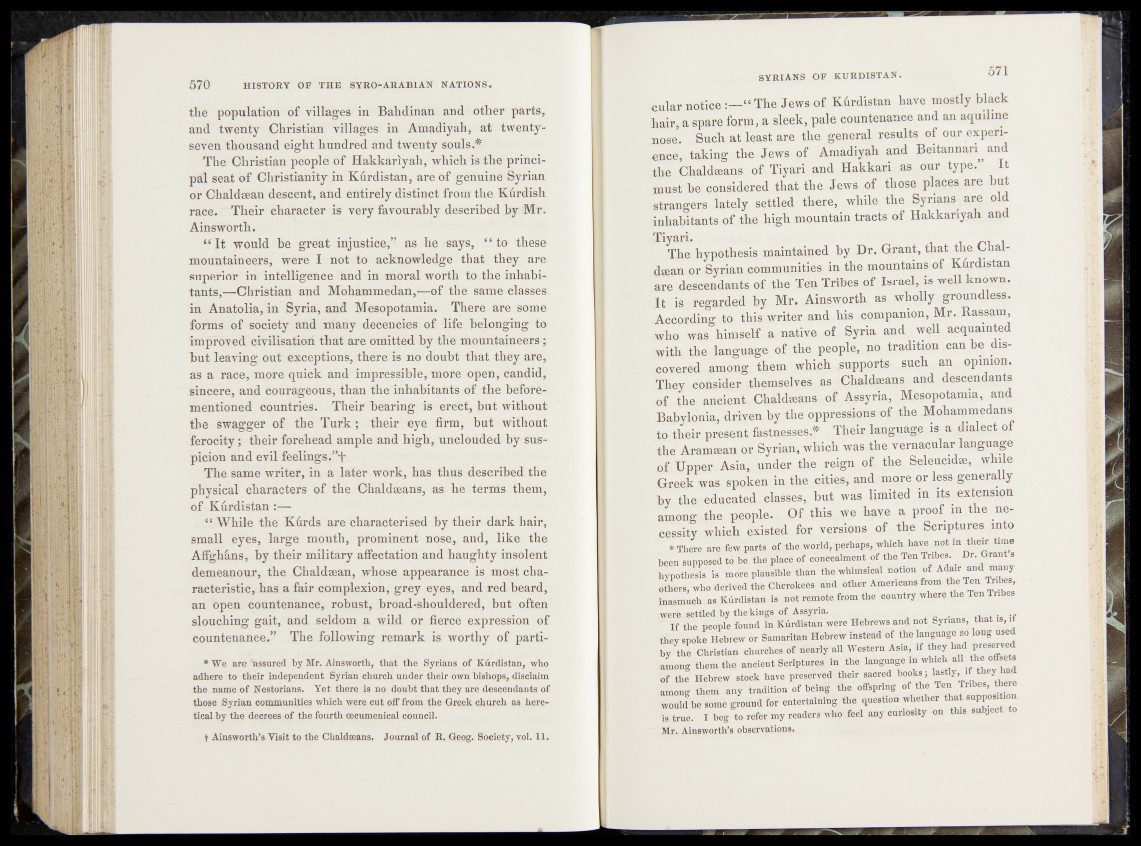
the population of Tillages" in Bahdinan and other parts^
and twenty Christian villages in Amadiyah, at- twenty-
seven thousand eight hundred and twenty souls.*
The Christian people of Hakkarlyah, which is the principal
seat of Christianity in Kdrdistan, are of genuine Syrian
or Chaldaean descent, and entirely distinct from the Kfirdish
race. Their character is very favourably described by Mr.
Ainsworth.
“ It would be great injustice,” as he says, “ to these
mountaineers, were I not to acknowledge that they, are
superior in intelligence and in moral worth to the inhabitants,—
Christian and Mohammedan,—of the same classes
in Anatolia, in Syria, and Mesopotamia. There are some
forms of society and many decencies of life belonging to
improved civilisation that are omitted by the mohntameers;
but leaving out exceptions, there is no doubt that they are,
as a race, more quick and impressible, more open, candid,
sincere, and courageous, than the inhabitants of the before-
mentioned countries. TheirTiearmg is erect, but without
the swagger of the Turk ; their eye firm, but without
ferocity; their forehead ample and high, unclouded by Ids*:
picion and evil feelings/’f-
The same writer, in a later work, has thus described the
physical characters of the Chaldseans, as-he terms them,
of Kurdistan :—
“ While the Kfirds are characterised by their dark hair,
small eyes, large mouth, prominent nose,, and, like the
A Afghans, by their military affectation and haughty insolent
demeanour, the Chaldaean, whose appearance is most characteristic,
has a fair complexion, grey eyes, .and red beard,
an open countenance, robust, broad -shouldered, but often
slouching gait, and seldom a wild or fierce expression of
countenance.” The following remark is worthy of parti-
* We are "assured by Mr. Ainsworth, that the Syrians of Kdrdistan, who
adhere to their independent Syrian church under their own bishops, disclaim
the name of Nestorians. Yet there is no doubt th a t they are descendants of
those Syrian communities which were cut off from the Greek church as heretical
by the decrees of the fourth oecumenical council.
t Ainsworth’s Visit to the Chaldseans. Journal of R. Geog. Society, vol. 11.
eular notice:—“ The Jews of Kdrdistan have mostly black
hair, a spare form, a sleek, pale countenance and an aquiline
nose. J u ^ at least, are tbe general results of our experience,
taking the Jews of Amadiyah and Beitannan ^ and
the Chaldseans of Tiyari and Hakkari as our type.” It
‘mu^fbe considered,,that the Jews of those places are but
.strangers .lately settled^ there, while, the Syrians are old
inhabitants of the high mountain tracts of Hakkariyah and
Tiyari. 1 - i \ r ■
The hypothesis maintained by Ur. Grant, that the Chaldaean
or^yrien communities, in the mountains of Kurdistan
are .descendants of Jhe Teii H Israel, is well known.
It is regarded by:,Mr. Ainsworth as wholly groundless.
According to this writer and his companion, Mr. llassam,
,who was m m a native,of,. Syria and well acquainted
with the language of the people, no tradition can be discovered
among them which supports: such an opinion.
They consider themselves as Chaldaeans and descendants
of the ancient Chaldmans of Assyria, Mesopotamia, and
Babylonia, driven by the oppressions of the Mohammedans
to thqir present fastnesses.* Their language is a dialect of
the Aramaean or Syrian, which was the vernacular language
of , Upper Asia, under the reign of the. Sejeucidae, while
Greek was spoken in the. cities, and more or less generally
by the educated classes, but was limited in its extension
among the people. Of this we have a proof in the necessity
which existed fqr versions of the Scriptures into
* There are few parts of the w w H Pe^ a p s , wbicb haw n,ot.iu their time
been supposed to be the place of concealment of the Ten Tribes. Dr. Grant s
hypothesis is more plausible than the whimsical notion of Adair and many
X s , who derived the Cherokees^.and other Americans from
inasmuch as Kurdistan is not remote from the country .where the Ten Tribes
were settledby the kings, o l Assyria. t c . . . . |
If the people found’ in Kdrdistan were Hebrews and not Syrians, that is, if
they spoke Hebrew or SamaritanHebrew Instead of the M P g g J long used
hy th . ChrUtiaa a h u * h e , of » « .ly all Wartem A.la, if they bad p r e y e d
among them the aneient Scrlptare. to the language m « h .ch a llth eo lfB eM
of the Hebrew stock have preserved their sacred books; lastly, if they had
a lo n g any tradition of being Hie'offspring of the Ten Tribes, 1±ere
would be some ground for entertaining the question whether th a t «W « “
is true. I beg to refer my readers-who feel any curiosity on this subject to
Mr. Ainsworth’s observations.